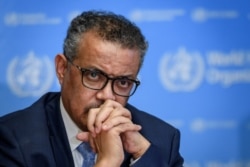Chinese President Xi Jinping is postponing a visit to Japan scheduled for next month as both countries deal with the outbreak of a new coronavirus that has infected 95,000 people in more than 75 countries.
Both Chinese and Japanese officials said Thursday Xi’s trip would be postponed until a more appropriate time.
China is the center of the outbreak, and while its new cases have dwindled in recent weeks, it has experienced the biggest toll with 3,000 deaths and hits to its economy as officials shut down cities to try to contain the spread.
Japan has seen more than 1,000 cases, many of them involving a cruise ship that spent weeks docked in quarantine in Yokohama.
Attempts to stop virus
As the virus has reached other regions of the world, governments have scrambled to institute their own measures, including shutting schools, banning large gatherings and limiting visitors from other nations.
Italy has shut schools and universities until March 15, and is banning spectators at sporting events for the next month. It has been one of the hardest-hit areas outside of China with more than 3,000 people infected.
Saudi Arabia followed a ban on foreigners entering the country to participate in pilgrimages to Mecca by adding a new ban on its own citizens and residents of performing the ritual.
The neighboring United Arab Emirates on Thursday advised its citizens and residents not to travel anywhere outside the country during the coronavirus outbreak.
In the United States, the focus of the outbreak has been on the Western states of Washington and California.
Cruise ship awaits tests
Princess Cruises said the U.S. Coast Guard will use a helicopter Thursday to drop coronavirus testing kits so that a group of fewer than 100 crew and passengers can be screened while the Grand Princess ship sits off the California coast.
No one will be allowed to leave the ship until those tests come back, a measure being taken after health officials linked two cases to passengers who took a February cruise aboard the ship and later tested positive. A total of 11 deaths, including one of those passengers, have been reported in the U.S. from the virus.
In California, Governor Gavin Newsom has declared a state of emergency, joining Washington, Florida and Hawaii.
All-out effort
World Health Organization chief Tedros Adhanom Ghebreyesus said Wednesday he is concerned that in some countries “the level of political will does not match the level of the threat we face.”
He said all countries must “educate their populations, to expand surveillance, to find, isolate and care for every case, to trace every contact, and to take an all-of-government and all-of-society approach.”
The U.S. Senate is expected Thursday to pass an $8.3 billion spending bill to tackle the virus, including research on a vaccine, the purchase of test kits and treatments. Some of the money will also be used to fund international efforts to stop the virus.
The House of Representatives approved the measure Wednesday, and President Donald Trump is expected to sign it.








